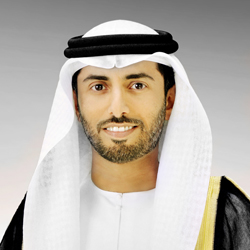ID :
341735
Thu, 09/18/2014 - 10:21
Auther :
Shortlink :
https://oananews.org//node/341735
The shortlink copeid
Al Mazrouie: U.A.E. pumps heavy investment into energy sector to raise output capacity to 3.5mbpd by 2017

Abu Dhabi (WAM): The U.A.E. is planning to raise its oil output capacity to 3.5 million barrels per day by 2017 and refining capacity to 1.1 mbpd from 707,000 barrels per day, affirming its strategic vision as a major oil producer in the world, Suhail bin Mohammed Faraj Faris Al Mazrouei, Minister of Energy, said yesterday.
''The U.A.E. holds 4% of the world's proven oil reserves and 3.5% of the world's gas reserves and its oil production accounts nearly 15% of the total oil output of OPEC. Hosting a seat of the International Renewable Energy Agency in the capital, Abu Dhabi, the U.A.E. has maintained its status as a world hub for renewable energy'' the minister told an high-profile audience of Sheikhs, ministers and diplomats at the Sheikh Mohamed bin Zayed Majlis.
Speaking in a lecture titled '' Energy Outlook and Resources Security in the U.A.E., and attended by H.H. Sheikh Hazza bin Zayed Al Nahyan, National Security Advisor and Deputy Chairman of Abu Dhabi Executive Council, Al Mazrouie noted that the U.A.E. wise leadership, led by President His Highness Sheikh Khalifa bin Zayed Al Nahyan, Vice President and Prime Minister and Ruler of Dubai His Highness Sheikh Mohammed bin Rashid Al Maktoum, Their Highnesses Supreme Council Members and Rulers of Emirates and His Highness General Sheikh Mohamed bin Zayed Al Nahyan, Crown Prince of Abu Dhabi and Deputy Supreme Commander of the U.A.E. Armed Forces, pay great attention to the energy sector and diversification of energy mix.
The government, he said, aims to make the U.A.E. of the world's best countries in policies of energy use and delivery of highest possible feasible investment in energy resources.
Addressing consumption patterns of water and energy in the U.A.E., the minister said economic growth and demographic expansion have driven annual water and electricity consumption to 6%, a rate that is higher the world growth average.
He stated that residential sector consumes 35% of total power generation while the commercial sector uses 31%, making the two sectors as the largest power consumers in the U.A.E..
The minister explained that per capita consumption of energy in the U.A.E.
is three time over the average due to waste and uneconomic use of water and electricity. ''Cost of these two key resources is more than Dh 35 billion a year and that Dh 3.5 bn can be saved every year if 10% of consumption is saved,'' he added.
He described energy consumption in the U.A.E. as among the world's highest but underlined the government's firm resolve to rationalise consumption.
He unveiled that the government was drafting a federal law for rationalisation of consumption of water and electricity.
He called the private sector and research and academic centres to engage in the national drive to promote the culture of sound consumption of these precious resources and preserve them for the next generations.
Outlining the State's policy to secure energy to consumers, the minister said the government strategy seeks to diversify the energy mix, whereby natural gas constitutes up to 70%, nuclear energy 25%, and solar energy up to 7% of the total generating electricity.
In his lecture, the minister spelled out the U.A.E. present and future policies and strategies in regards to solar energy, nuclear energy and rationalisation of the vital water and electricity resources.
Answering a question about U.A.E.'s role in the world energy market, the minister stressed that OPEC is working to stabilise world energy markets by pumping enough supplies and '' doesn't have any say in determining oil prices'', affirming that the U.A.E. has made major contributions to secure oil supplies to the market.
According to him, U.A.E., Saudi Arabia and Kuwait had played a positive role in stabilising oil markets at a time of recent geopolitical tensions in the region.
The minister ruled out any threat shale oil could pose to crude oil producers, saying'' I don't think any challenge shale oil can pose on us, rather it is a complementary factor in supplying oil to world energy markets which book a demand for energy between 1-1.5 mbpd a year.'' He believed that US shale oil and gas output had contributed substantially to keep oil prices at their current levels. '' If it had not been for the US shale oil production, we would have seen oil prices much higher than current ceilings.'' H.H. Sheikh Nahyan bin Zayed Al Nahyan, Chairman of the Board of Trustees of Zayed bin Sultan Al Nahyan Charitable and Humanitarian Foundation, H.H. Sheikh Omar bin Zayed Al Nahyan, Deputy Chairman of the Board of Trustees of Zayed bin Sultan Al Nahyan Charitable and Humanitarian Foundation, and a number of Sheikhs, ministers, senior officials, diplomats and energy experts, attended the lecture. – Emirates News Agency, WAM





